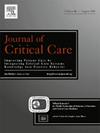组织文化与 ICU 专业人员职业倦怠之间的相互作用:一项横断面多中心研究
IF 3.2
3区 医学
Q2 CRITICAL CARE MEDICINE
引用次数: 0
摘要
目的 组织文化被认为是 ICU 专业人员职业倦怠的保护因素。本研究旨在研究组织文化作为潜在前因与之前发现的职业倦怠中介风险因素(即工作与生活的平衡和精神压力)之间的关联。主要结果测量指标是职业倦怠的核心症状--情绪衰竭,使用经过验证的荷兰版马斯拉奇职业倦怠量表进行测量。组织文化采用护理文化晴雨表进行评估,该晴雨表可测量组织文化的五个方面。结果 696 名重症监护室专业人员(39.7%)做出了回应。在单变量和多变量模型中,CoCB 的所有方面都与职业倦怠的情感衰竭部分呈负相关。组织文化的四个方面与道德困扰、工作对家庭的溢出效应和情感衰竭之间的序列关联有明显的相关性。结论组织文化的多个方面在很大程度上通过道德困扰和工作与生活的平衡,以间接的方式减轻了 ICU 专业人员的职业倦怠。改善组织文化可以减轻 ICU 临床医生的职业倦怠症状。本文章由计算机程序翻译,如有差异,请以英文原文为准。
The interplay between organizational culture and burnout among ICU professionals: A cross-sectional multicenter study
Purpose
Organizational culture is considered a protective factor against burnout among ICU professionals. The aim of this study is to study the association between organizational culture as a potential antecedent to previously found mediating risk factors for burnout, namely, work-life balance and moral distress.
Materials and methods
Multicenter cross sectional study in eleven Dutch ICUs. The primary outcome measure was the core symptom of burnout, emotional exhaustion, measured using the validated Dutch version of the Maslach Burnout Inventory. Organizational culture was assessed using the Culture of Care Barometer, which measures five aspects of organizational culture. Moral distress and work-life balance were measured with validated questionnaires.
Results
696 ICU professionals (39.7 %) responded. All aspects of the CoCB were negatively associated with the emotional exhaustion component of burnout, both in univariable and multivariable models. Four aspects of organizational culture were significantly associated to the serial association between moral distress, work-to-home spillovers, and emotional exhaustion. For these aspects, the total indirect association was equal or larger than the total direct association.
Conclusions
Multiple aspects of organizational culture reduce burnout among ICU professionals in a largely indirect manner, via moral distress and work-life balance. Improving organizational culture can mitigate burnout symptoms among ICU clinicians.
求助全文
通过发布文献求助,成功后即可免费获取论文全文。
去求助
来源期刊

Journal of critical care
医学-危重病医学
CiteScore
8.60
自引率
2.70%
发文量
237
审稿时长
23 days
期刊介绍:
The Journal of Critical Care, the official publication of the World Federation of Societies of Intensive and Critical Care Medicine (WFSICCM), is a leading international, peer-reviewed journal providing original research, review articles, tutorials, and invited articles for physicians and allied health professionals involved in treating the critically ill. The Journal aims to improve patient care by furthering understanding of health systems research and its integration into clinical practice.
The Journal will include articles which discuss:
All aspects of health services research in critical care
System based practice in anesthesiology, perioperative and critical care medicine
The interface between anesthesiology, critical care medicine and pain
Integrating intraoperative management in preparation for postoperative critical care management and recovery
Optimizing patient management, i.e., exploring the interface between evidence-based principles or clinical insight into management and care of complex patients
The team approach in the OR and ICU
System-based research
Medical ethics
Technology in medicine
Seminars discussing current, state of the art, and sometimes controversial topics in anesthesiology, critical care medicine, and professional education
Residency Education.
 求助内容:
求助内容: 应助结果提醒方式:
应助结果提醒方式:


